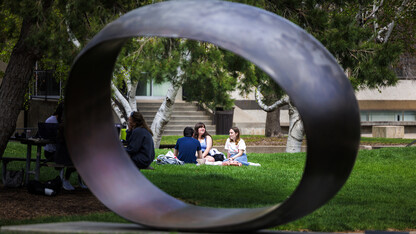· 3 min read
Styrofoam-free policy reinforces Nebraska’s sustainability efforts

Creating a more sustainable world often comes down to the little things.
Five years ago, a large majority of cups, to-go containers and plates handed out at the University of Nebraska–Lincoln were made of expanded polystyrene, or Styrofoam. On the surface, it might have seemed like a harmless practice — but with each product taking an average of 500 years to decompose in a landfill, the impact to the environment was significant.
The university banned Styrofoam products in 2016 and has been using more biodegradable materials ever since. Now, Prabhakar “Prabs” Shrestha, director of sustainability, is encouraging all members of the campus community to view the official foam-free policy recently published on the Business and Finance website.
“When we were doing our STARS submission this fall, which ranks universities across the country on their sustainability performance, it came up that the organization gives credit for policies or guidelines that have been published online. In that discovery, we found out that our foam-free policy didn’t exist anywhere online, even though it has been widely practiced,” Shrestha said.
“Many people don’t know about it, so we wanted to inform our community about what it means for students, faculty and staff on campus.”
On an individual level, the university’s Styrofoam ban gives Huskers a financial incentive to use more sustainable products.
“If a department or RSO is using money to buy foam products, let’s say for a chili feed, that money will not be reimbursed,” Shrestha said. “It basically boils down to, ‘You can do that, but you’ll have to do it with your own pocket money and not use the university’s money.’”
On a broader scale, dining centers across campus now use compostable paper plates and containers, as well as reusable plastic containers, in place of Styrofoam products.
According to Shrestha, one of the most far-reaching impacts of the 2016 ban was on private businesses who partner with the university.
“If you want to do business at the University of Nebraska–Lincoln, you cannot use foam products,” Shrestha said. “You can talk to anybody who’s been a frequent customer at The Mill. The cups changed recently because once they started doing business at Innovation Campus, they couldn’t keep using their Styrofoam cups.
“If you think of the economics of scale, it’s more practical to buy the same kind of product in bulk rather than two different kinds. So now, at any Mill location you visit across Lincoln, they all have compostable cups. That was because of this kind of policy.”
The policy also had a ripple effect when a Dunkin’ Donuts location opened in Love Library’s Adele Coryell Hall Learning Commons in 2016.
“That Dunkin’ Donuts was the first location outside of New York to have non-Styrofoam cups. I think that’s what the common practice is today, all over, but we had such huge impact when it came to the sustainability side of things,” Shrestha said.
Policies like the Styrofoam ban have helped Nebraska gradually increase its sustainability ranking over the years, coming within three points of a gold STARS rating this fall. Other similar proposals will be available in the Environment, Sustainability and Resilience Master Plan being published in the coming weeks.
“It’s already in the master plan for the university that we’re going to zero waste in 2030,” Shrestha said. “There are plenty more exciting steps in that plan that I can’t wait for the campus community to read about.”







